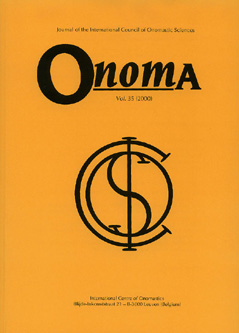 previous article in this issue previous article in this issue | next article in this issue  |

Preview first page |
Document Details : Title: Torp-names in Östergötland Subtitle: A Pedagogical Experiment Author(s): NYSTRÖM, Staffan Journal: Onoma Volume: 39 Date: 2004 Pages: 195-215 DOI: 10.2143/ONO.39.0.2020713 Abstract : In the Autumn of 2001, a course in name research was held at the Department of Scandinavian Languages, University of Stockholm. In contrast to the many onomastic courses that had been held previously, this course was planned as a joint research project among six students who in each lesson were given a different aspect of the research process to work with and to report on later. The topic of the project was place-names ending in -torp (-orp, -arp, -rup) in the province of Östergötland, Sweden, with regard to their frequency, age, meaning, regional variation, etc. Etymologically, Sw. torp, Osw. þorp corresponds to Eng. thorp, OEng. þorp, Germ. Dorf. The aim of the course was not primarily to bring about new and exciting research findings but to let the students in as short a time as possible and through their own experience become aware of the particular problems and methods of place-name research. Probably this approach provides a better foundation for further onomastic research than is potentially offered by a literature-based course with ensuing examination. This article describes in some detail the ideas concerning the course, how the course was carried out, the students’ reactions, and the outcome of the course in terms of obtained results. Durant l’automne 2001, un cours sur la recherche onomastique a été donné au sein du Département des Langues scandinaves de l’Université de Stockholm. Contrairement aux nombreux cours d’onomastique précédemment donnés, celui-ci a été conçu comme un projet commun de recherche : à chaque cours, les six étudiants devaient travailler et faire un rapport sur différents aspects du processus de recherche. Le projet avait pour sujet les noms de lieux composés en -torp (-orp, -arp, -rup) dans la province suédoise de l’Östergötland, quant à leur fréquence, époque, signification, variation régionale etc. Suédois torp, anc. suédois þorp correspond à l’anglais thorp, anc. anglais þorp, allemand Dorf. Le but du cours n’était pas, à l’origine, de découvrir des résultats nouveaux et excitants, mais de laisser les étudiants prendre connaissance, dans un laps de temps le plus bref possible, des problèmes propres et des méthodes de la recherche toponymique. Cette approche fournit probablement une meilleure base à la recherche onomastique supérieure que celle fournie par les cours fondés sur la littérature et des examens. Le présent article décrit en détail les concepts du cours, son exécution, les réactions des étudiants et ses résultats globaux. An der Abteilung für skandinavische Sprachen an der Universität Stockholm wurde im Herbst 2001 ein namenkundlicher Kurs gehalten. Im Gegenteil zu den vielen früheren namenkundlichen Kursen war dieser als ein gemeinsames Forschungsprojekt geplant. Zu jeder Unterrichtsstunde bekamen die sechs teilnehmenden Studenten unterschiedliche Aspekte des Forschungsprozesses zu bearbeiten und darauf davon zu berichten. Gegenstand des Projekts war die Ortsnamen auf -torp, (-orp, -arp, -rup) im Bezirk Östergötland, Schweden, unter Berücksichtigung von Frequenz, Alter, Bedeutung, regionaler Variation usw. Auf der etymologischen Ebene entspricht schw. torp, altschw. þorp eng. thorp, alteng. þorp, dt. Dorf. Der Zweck des Kurses war nicht, neue und erregende Ergebnisse zu entdecken, sondern die Studenten in möglichst kurzer Zeit und durch ihre eigene Erfahrung der besonderen Probleme und Methoden der Namenforschung gewahr machen. Wahrscheinlich gibt dieser Vorgang eine bessere Grundlage für weitere namenkundliche Untersuchungen als ein literaturbasierter Kurs mit nachfolgenden Prüfungen. Der Artikel beschreibt in Einzelheiten die Ideen des Kurses, wie er durchgeführt wurde, die Reaktionen der Studenten und die Gesamtergebnisse. |
|


